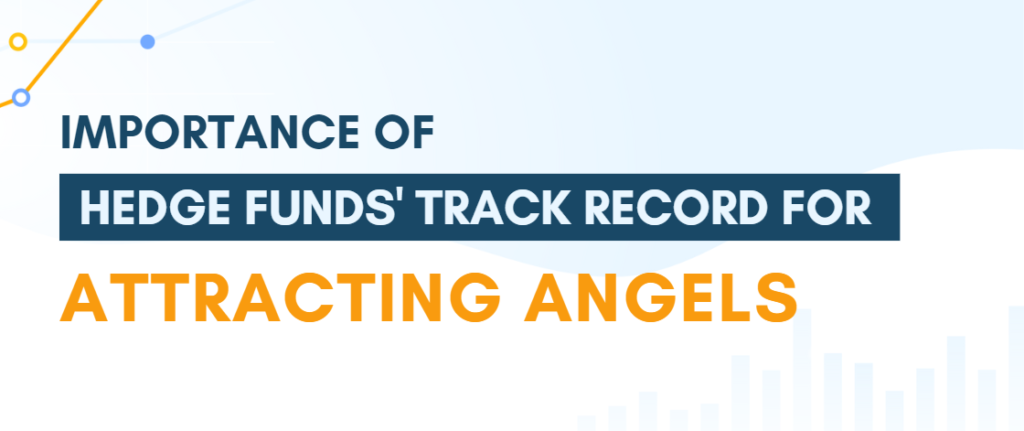
Angel investors give capital to startups and early-stage companies in exchange for stock ownership or convertible debt. They are often seasoned business owners or professionals who spend their own money and use their industry knowledge to aid in expanding the companies they invest in.
Due to their ability to provide large returns and diversify investment portfolios, hedge funds have grown in popularity among angel investors in recent years. Hedge funds are a subset of alternative investments that employ various investing methods, such as long-short equity, event-driven, and global macro strategies, to produce returns. Intending to achieve absolute returns independent of market fluctuations, these methods frequently entail investing in a broad range of assets, including stocks, bonds, commodities, currencies, and derivatives.
For angel investors, investing in hedge funds may have a number of advantages, including access to experienced fund managers with in-depth financial knowledge, portfolio diversification, and the possibility of high returns that are not associated with conventional asset classes.
In this article, we’ll go through the main criteria angel investors use to evaluate hedge fund investments. Hedge fund managers may expand their investment portfolios and draw new angel investors by being aware of these variables.
First, let’s start with how angel investors evaluate hedge fund strategies.

How do Angel Investors Evaluate Hedge Funds’ Investment Strategies?
Angel investors largely provide funding for hedge funds. They must thoroughly assess the investing strategy of the hedge fund, though, to guarantee a profitable investment. The following are the main elements that angel investors consider while assessing hedge fund investing strategies:
- Based on the fund’s historical performance, risk management procedures, alignment with the investors’ own investing goals and risk appetite, and other factors, angel investors often assess the hedge fund’s investment strategy.
- Angel investors use historical returns, risk-adjusted performance indicators, and portfolio composition to evaluate the hedge fund’s success. Along with using different investment techniques and the fund manager’s experience and knowledge in the field, they also consider the fund’s investing process.
- Angel investors also consider the hedge fund’s risk management procedures, such as its methods for risk assessment, monitoring, and reduction. They evaluate the fund’s capacity for risk management and market-change adaptation.
- Angel investors also look at the hedge fund’s fee schedule, liquidity conditions, and investment limitations. To make sure the fund is effectively managed and in line with its investment objectives, they evaluate its transparency, governance, and operational procedures.
- Angel investors may engage with licensed financial advisers or consultants who may offer an understanding of the hedge fund’s investment strategy, risks, and prospective returns in order to evaluate hedge fund investments. Financial modeling, stress testing, and scenario analysis are a few examples of quantitative and qualitative analyses that might be used in the review process.
One of the most important steps in an angel investor’s decision-making process is assessing a hedge fund’s investing strategy. To evaluate the likelihood of future gains, angel investors must also consider the history of the hedge fund. Why? Let’s see that in the following section.
If you need some ideas about what to read next, here they are:
- Managing Conflicts in Family Business: Strategies for Resolving Differences and Maintaining Harmony
- Active v/s Passive Investing: Which Strategy Fits Your Investment Goals?
- The Changing Landscape of Consumer Debt and the Relationship Between Consumer Debt and Recession Risk

Importance of Hedge Funds’ Track Record for Attracting Angels
This section will look at how crucial a hedge fund’s track record is in luring angel investors. The following are the reasons why:
- The past performance of a hedge fund is a crucial criterion that angel investors take into account when assessing possible investments. The potential of a fund to create returns under various market situations and investing methods may be understood by looking at historical results.
- Angel investors compare the hedge fund’s previous results to sector benchmarks and other funds in the industry. Investors can use this comparison to see if the fund has consistently outperformed its rivals.
- Angel investors take into account performance volatility and consistency in addition to returns. They evaluate the fund’s capacity for risk management and long-term consistency of return.
- Analyzing a hedge fund’s performance history can also reveal information about the manager’s investing philosophies, methods, and strategies. Investors can evaluate the fund manager’s aptitude for spotting and seizing investing opportunities as well as for navigating market turbulence and downturns.
- The track record of a hedge fund may also be a key element in luring new investors. Positive historical returns can boost investor confidence and bring in fresh investment money, while low historical returns might cause investor redemptions and bad press.
Thus, while analyzing possible investments, angel investors must consider the historical returns, volatility, and consistency of the performance of a hedge fund. A successful track record can assure potential investors of the fund’s capacity to create returns and manage risks. It can play a key role in luring new investors.
When analyzing possible investments, angel investors closely examine hedge fund returns and fee structures and assess investing methods and track records. In the next section, we will cover how angel investors assess hedge fund profits and fee structures.
How Angel Investors Evaluate Hedge Fund Returns and Fees Structure?
Angel investors consider a number of elements, such as the fund’s performance and fee structure, while assessing hedge fund investments. The fund’s performance is evaluated by comparing the returns to industry benchmarks and peer funds. In order to confirm that the fund regularly delivers good returns, angel investors often look at the returns across various time periods. Additionally, the fee structure is crucial, and angel investors compare rates to industry norms and those of comparable funds. They choose investment vehicles with lower management costs and greater performance fees that are in line with their investment objectives.
Another crucial factor is the pricing structure’s transparency and clarity. In conclusion, assessing hedge fund returns and fee structures is crucial to the decision-making process for angel investors.
Apart from evaluating the fund’s performance and fee structure, angel investors also pay attention to the hedge fund’s communication practices. Clear and effective communication between the fund manager and investors is crucial for building a strong relationship and trust. Angel investors assess the fund’s communication practices to determine whether they are timely, informative, and transparent.
Taking a closer look at how they operate and how they ensure hedge funds, let’s find out how their practices differ.

Factors That Angel Investors Consider While Evaluating Communication Practices
Some key factors that angel investors consider when evaluating hedge fund communication practices include:
- Angel investors prefer funds that provide regular reports with detailed information on fund performance, strategy, and portfolio holdings.
- Investors want transparency and clarity in the fund’s operations and performance. They need to understand how the fund operates, how decisions are made, and how risks are managed.
- Angel investors prefer fund managers who are accessible and responsive to their queries and concerns. They want to establish a relationship with the fund manager and understand their investment approach.
- Investors need assurance that the fund manager complies with all regulatory requirements and standards. They also look for funds that have a solid compliance framework in place.
Establishing a good connection between the fund manager and investors depends on excellent communication. To guarantee openness, frequent reporting, and access to the fund management, angel investors assess the fund’s communication procedures.
The Bottom Line
This blog explains the important criteria angel investors use to evaluate hedge fund investments, including investment strategies, track records, and fee structures. They prefer investment vehicles with lower management costs and greater performance fees aligning with their objectives. A hedge fund’s track record is a critical criterion that angel investors consider when assessing possible investments. Hedge fund managers must be aware of these factors to attract new angel investors and expand their investment portfolios.
Join Our Newsletter
Elevate your financial game & join the ranks of elite investors with Secvolt’s exclusive newsletter.
Join Our Newsletter
Elevate your financial game & join the ranks of elite investors with Secvolt’s exclusive newsletter.
Don’t just dream of wealth; achieve it with Secvolt. Schedule a call today for personalized guidance on your investment strategy and join the ultra-successful.
Ready to unlock your wealth’s truest potential & cherish affluence?
Secvolt, our hedge fund, sets the bar high with a record-breaking performance of 262% returns in 2022. With the brilliance of our highly advanced quant models and the efficiency of our risk mitigation protocols, we are yet to see a loss!
We’re the perfect ally to help you succeed financially and build the lasting legacy you have always aspired for.
Get in touch today. YOUR LEGACY AWAITS YOU…





